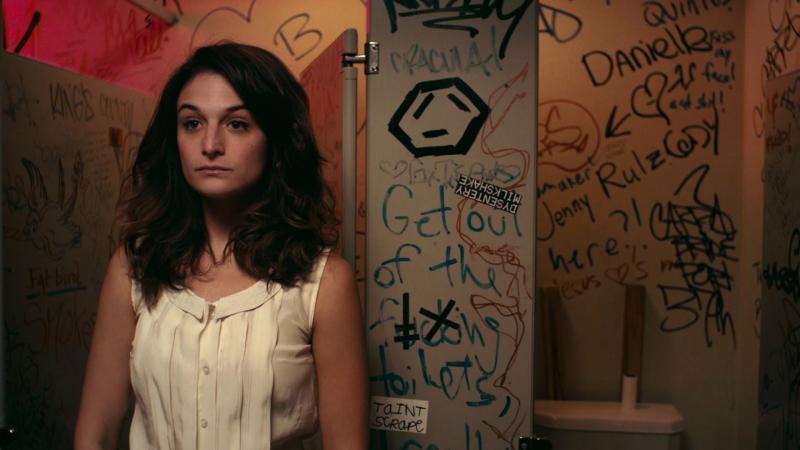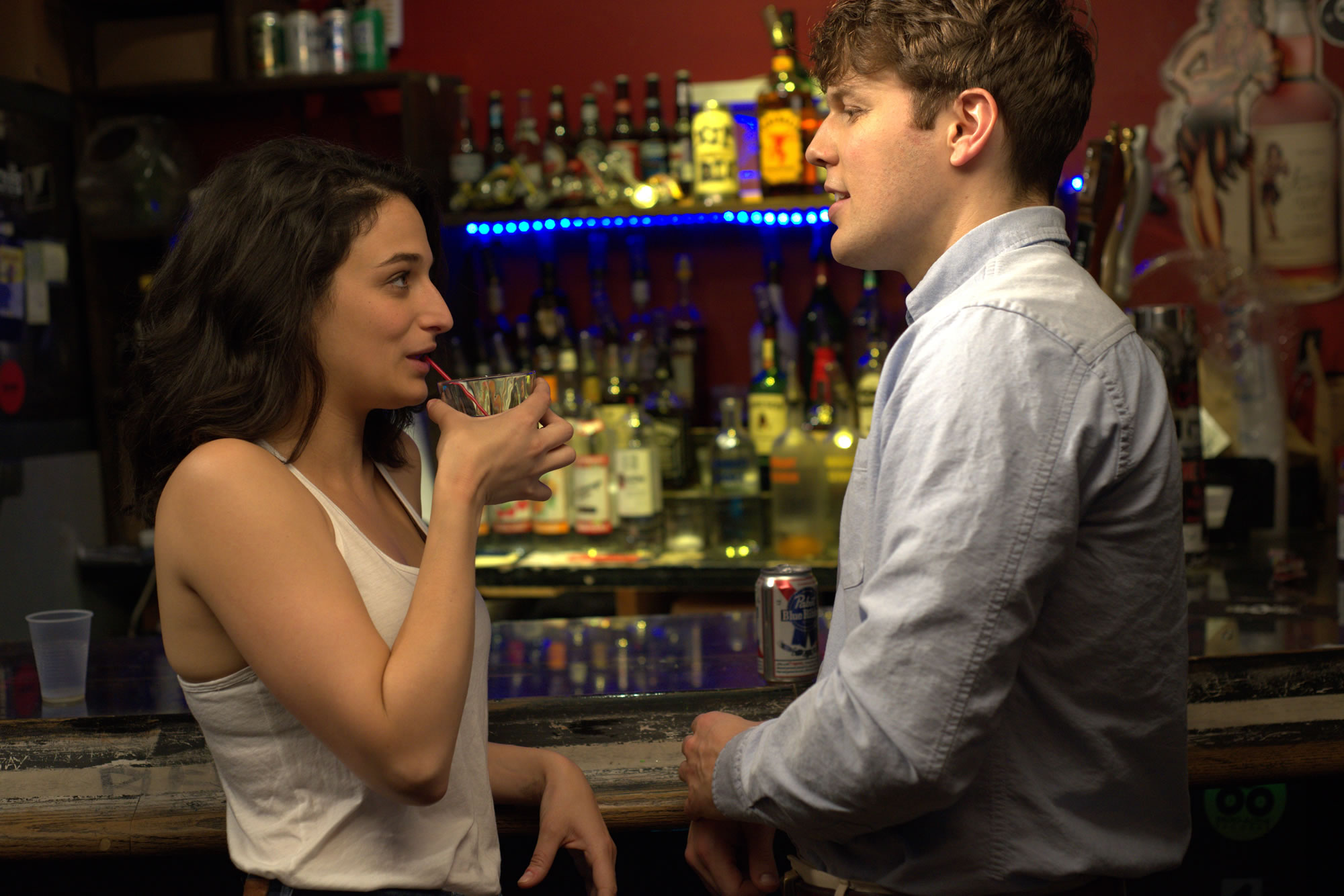Obvious Child | reviews, news & interviews
Obvious Child
Obvious Child
Jenny Slate stars in a frank, wry study of female arrested development

Opening as it does on a frank, witty and somewhat extended discussion of female discharge, Obvious Child lets you know from the outset that it is every bit as uninterested in making nice as its blunt lead character.
Immediately, then, writer-director Gillian Robespierre is doing something compelling with the question of what makes good comedy. We laugh along with the audience at Donna’s witty and self-deprecating portrait of her love life, but viewed in retrospect after her boyfriend’s response – “Things haven’t been great between us for months” – the joke is no longer very funny.
Breakups are generally accepted as fertile ground for comedy; less so unwanted pregnancy, which is the subject matter that has led to the film being somewhat unfortunately dubbed as an “abortion rom-com”. After a rebound one-night stand with the preppy Max (Jake Lacy) leaves her pregnant, Donna knows immediately that she wants an abortion, and it says a lot about the conservative slant of modern Hollywood that this decisive moment still seems groundbreaking.
 There was a time only two or three years ago, too, when it still felt novel to see big-screen comedy centred around women in arrested development, rather than the man-children who for so long had the genre cornered. Between the game-changing success of Bridesmaids, the cultural impact of Lena Dunham’s Girls and related indie offshoots like last year’s Frances Ha, the balance has shifted, and yet Obvious Child still feels fresh and in many ways vital.
There was a time only two or three years ago, too, when it still felt novel to see big-screen comedy centred around women in arrested development, rather than the man-children who for so long had the genre cornered. Between the game-changing success of Bridesmaids, the cultural impact of Lena Dunham’s Girls and related indie offshoots like last year’s Frances Ha, the balance has shifted, and yet Obvious Child still feels fresh and in many ways vital.
“You are unapologetically yourself on that stage, and that’s why people love you,” says Donna’s supportive best friend Nellie (Gaby Hoffmann), giving in many ways a generous assessment. While Slate makes Donna consistently endearing, she’s also self-absorbed, abrasive and pathologically immature, and leaves you in no doubt as to whether she should be raising a child.
While the consequences of Donna “playing Russian Roulette with her vagina” are wryly understated, the emotional impact isn’t. The most fully-realised relationship in a script that often feels scattershot is with her initially nagging and goal-oriented mother, whose reaction to the news makes for the film’s most moving scene. Less successful is Max, who improbably tracks Donna down after their encounter and proves himself to be a bouquet-wielding suitor of the highest order.
Much like its flighty, flawed heroine, Obvious Child could easily have been insufferable with its neurotic tone and knee-jerk tendency towards crude humour. Instead, it’s a a frank, funny and emotionally sophisticated story that quietly declines to fall in line with what is expected of young women on the big screen.
The future of Arts Journalism
You can stop theartsdesk.com closing!
We urgently need financing to survive. Our fundraising drive has thus far raised £49,000 but we need to reach £100,000 or we will be forced to close. Please contribute here: https://gofund.me/c3f6033d
And if you can forward this information to anyone who might assist, we’d be grateful.

Subscribe to theartsdesk.com
Thank you for continuing to read our work on theartsdesk.com. For unlimited access to every article in its entirety, including our archive of more than 15,000 pieces, we're asking for £5 per month or £40 per year. We feel it's a very good deal, and hope you do too.
To take a subscription now simply click here.
And if you're looking for that extra gift for a friend or family member, why not treat them to a theartsdesk.com gift subscription?
more Film
 Steve review - educator in crisis
Cillian Murphy excels as a troubled headmaster working with delinquent boys
Steve review - educator in crisis
Cillian Murphy excels as a troubled headmaster working with delinquent boys
 Can I get a Witness? review - time to die before you get old
Ann Marie Fleming directs Sandra Oh in dystopian fantasy that fails to ignite
Can I get a Witness? review - time to die before you get old
Ann Marie Fleming directs Sandra Oh in dystopian fantasy that fails to ignite
 Happyend review - the kids are never alright
In this futuristic blackboard jungle everything is a bit too manicured
Happyend review - the kids are never alright
In this futuristic blackboard jungle everything is a bit too manicured
 Robert Redford (1936-2025)
The star was more admired within the screen trade than by the critics
Robert Redford (1936-2025)
The star was more admired within the screen trade than by the critics
 Blu-ray: The Sons of Great Bear
DEFA's first 'Red Western': a revisionist take on colonial expansion
Blu-ray: The Sons of Great Bear
DEFA's first 'Red Western': a revisionist take on colonial expansion
 Spinal Tap II: The End Continues review - comedy rock band fails to revive past glories
Belated satirical sequel runs out of gas
Spinal Tap II: The End Continues review - comedy rock band fails to revive past glories
Belated satirical sequel runs out of gas
 Downton Abbey: The Grand Finale review - an attemptedly elegiac final chapter haunted by its past
Noel Coward is a welcome visitor to the insular world of the hit series
Downton Abbey: The Grand Finale review - an attemptedly elegiac final chapter haunted by its past
Noel Coward is a welcome visitor to the insular world of the hit series
 Islands review - sunshine noir serves an ace
Sam Riley is the holiday resort tennis pro in over his head
Islands review - sunshine noir serves an ace
Sam Riley is the holiday resort tennis pro in over his head
 theartsdesk Q&A: actor Sam Riley on playing a washed-up loner in the thriller 'Islands'
The actor discusses his love of self-destructive characters and the problem with fame
theartsdesk Q&A: actor Sam Riley on playing a washed-up loner in the thriller 'Islands'
The actor discusses his love of self-destructive characters and the problem with fame
 Honey Don’t! review - film noir in the bright sun
A Coen brother with a blood-simple gumshoe caper
Honey Don’t! review - film noir in the bright sun
A Coen brother with a blood-simple gumshoe caper
 The Courageous review - Ophélia Kolb excels as a single mother on the edge
Jasmin Gordon's directorial debut features strong performances but leaves too much unexplained
The Courageous review - Ophélia Kolb excels as a single mother on the edge
Jasmin Gordon's directorial debut features strong performances but leaves too much unexplained

Add comment